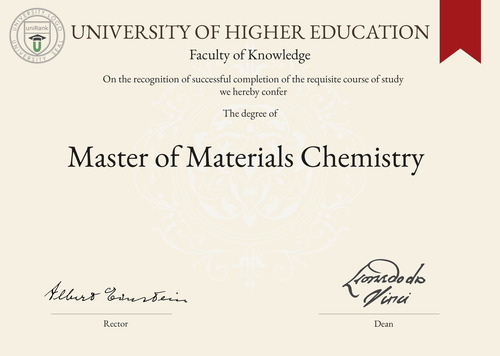
Master of Materials Chemistry (M.M.C.)
Guide to Master of Materials Chemistry Program/Course/Degree
Master of Materials Chemistry (M.M.C.)

Program Name:
Master of Materials ChemistryProgram or Degree abbreviation:
M.M.C.Duration range:
The duration of the program typically ranges from 1 to 2 years.Tuition range:
The tuition fees for the program can vary depending on the chosen country or university. Please refer to the respective university's website for specific information.Overview:
The Master of Materials Chemistry program is designed to provide students with a comprehensive understanding of the chemical properties and behavior of materials. It focuses on the synthesis, characterization and application of various materials, including polymers, metals, ceramics and composites. Students gain hands-on experience in laboratory work, research projects and theoretical studies.Curriculum Overview by year:
- Year 1: - Core courses in Inorganic Chemistry, Organic Chemistry, Physical Chemistry and Materials Science - Laboratory work and practical sessions - Elective courses in specialized areas of Materials Chemistry - Year 2: - Advanced courses in Materials Synthesis, Characterization Techniques and Materials Applications - Research project or thesis work - Seminars and presentationsKey Components:
- In-depth understanding of the chemical properties and behavior of materials - Hands-on laboratory experience in synthesis and characterization techniques - Research projects and thesis work - Specialized elective courses to tailor the program to individual interests - Collaboration with industry partners for real-world applicationsCareer Prospects:
Graduates of the Master of Materials Chemistry program have a wide range of career opportunities in various industries, including: - Materials research and development - Chemical manufacturing - Pharmaceutical and biotechnology companies - Energy and environmental sectors - Quality control and testing laboratories - Academic and research institutionsSalary Expectations:
The salary expectations for graduates of the Master of Materials Chemistry program can vary depending on factors such as location, industry and level of experience. Generally, graduates can expect competitive salaries in line with their qualifications and the demand for materials chemistry expertise in the job market. For a more accurate understanding of salary expectations, you can utilize the Job Sites Search Engine, from our sister site jobRank, which searches over 4,600 job sites worldwide. Make sure to specify not only the job title but also the country you are interested in.Conclusions:
It is important to note that the duration, tuition fees, curriculum, key components, career prospects and salary expectations of the Master of Materials Chemistry program can vary depending on the chosen country or location of study, as well as the specific university offering the program. Prospective students are encouraged to research and compare different universities and countries to find the best fit for their academic and career goals. Visitors can search for where this specific degree, Master of Materials Chemistry, is offered anywhere in the world through the uniRank World Universities Search Engine, which provides comprehensive information on universities and their programs worldwide.World Universities Search Engine
search for Master of Materials Chemistry (M.M.C.) and add the Location (country, state etc.) or specific University you are interested in studying at.
Query examples:
- Master of Materials Chemistry (M.M.C.) United States
- Master of Materials Chemistry (M.M.C.) United Kingdom online
- Master of Materials Chemistry (M.M.C.) Australia international students
- Master of Materials Chemistry (M.M.C.) University of California
- Master of Materials Chemistry (M.M.C.) University of London tuition fees
- Master of Materials Chemistry (M.M.C.) University of Sydney scholarships
Share Program/Course
Interesting? Share this program/course/degree info with your friends now.